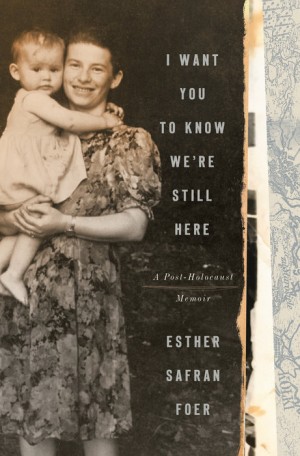“For much of my adult life I have been haunted by the presence of absence,” confesses Esther Safran Foer at the end of her deeply moving memoir, I Want You to Know We’re Still Here. Foer was born in a displaced-persons camp in Lodz, Poland in 1946 to parents who had managed to evade death — through sheer luck in the case of her mother, Ethel (“My mother spent the war on the run,” Foer recounts), and through the brave actions of righteous gentiles, who helped her father, Louis, escape invading Nazis after they massacred most of the Jews living in his Ukrainian shtetl, Trochenbrod (an incident detailed by Foer’s son, Jonathan Safran Foer, in his 2002 novel Everything Is Illuminated).
Growing up in Washington, D.C., Esther Safran Foer felt the disabling weight of her parents’ silence about the war. Above all, she was haunted by her father’s suicide, which happened in 1954, when she was a young girl. “His death became part of the family canon of unspeakable stories” she tells the reader. Rather than ignore the repressed horrors her relatives experienced, Foer chose to become “the keeper of memory,” the collector of “shards of memory,” the historian investigating family trauma. “Finding these links,” she writes, “is my calling.”
“How do you remember someone who has left no trace?” Foer asks at the beginning of her narrative. How exactly did he survive? What happened to his family — his first family, which he had before he met Foer’s mother after the war?
Finding the answers involves both luck and endless detective work; she travels to Brazil, Argentina, Israel, and Ukraine in order to seek out Holocaust survivors who might fill in gaps in memory. The emotional core of I Want You to Know We’re Still Here recounts Foer and her journalist son Franklin’s pilgrimage to the former shtetls of Kolki and Trochenbrod. Mother and son imagine the once vibrant life of her parents’ and grandparents’ world in Eastern Europe, before the Shoah. The result is a poignant narrative of return and rededication, a physical and spiritual teshuvah to the site of family origins.
I Want You to Know We’re Still Here is a beautifully written account of a relentless journey to the genealogical — indeed geographic — core of family trauma to uncover mysteries buried in the mass graves of an old-world shtetl. The memoir concludes with a new-world birth — a grandson who carries Foer family history in his name and soul — symbolizing the promise of the next generation. In uncovering the past, Foer demonstrates how memory can, therapeutically, fill an aching absence.
Donald Weber writes about Jewish American literature and popular culture. He divides his time between Brooklyn and Mohegan Lake, NY.







